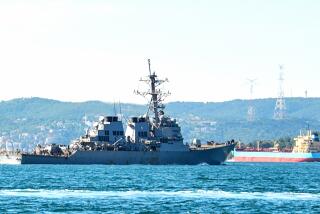Swaying Between East, West
- Share via
ABOARD THE USS CARL VINSON IN THE NORTHERN ARABIAN SEA--When Fawaz goes home to Jordan, his relatives brush him off. They don’t want to sit over dinner with him, don’t care to listen to tales of his travels. At best, they say, he’s a man of questionable politics. At worst, a traitor.
“I say, ‘I’m just doing my job,’ ” he says. “But they don’t want to talk to me.”
For 12 years, Fawaz has been an enlisted member of the U.S. Navy. The 38-year-old sailor has found a niche on the sea: He’s the Muslim lay leader of this aircraft carrier. These days, counseling and rallying the smattering of Muslim sailors are no simple tasks.
It is a trying time to be Muslim, a draining time to be military and a wrenching time to be both.
The United States is assaulting Afghanistan with a relentless string of bombing raids. The U.S. government has vowed, time and again, that the “war on terrorism” is just that--and not a war on Islam. Nevertheless, some Muslims regard the U.S. campaign as a harbinger of a latter-day holy war.
In this floating American village in the Arabian Sea, a handful of sailors are caught uncomfortably between East and West, between Judeo-Christian and Muslim, between mutual misconceptions. They are occasionally confronted with wisecracks and distrust from their shipmates--but they don’t like to talk about that.
“It’s no big deal,” says a 19-year-old sailor named Reza. “I don’t mind. A lot of people just don’t know that much.”
Sweating in his turtleneck and camouflage trousers, Reza folds himself into a chair. It’s lunchtime, and he has a break from the vast, clanging hangar where he orders supplies for airplane repair. (Military policy does not allow the disclosure of last names for anyone but commanding officers in war operations.)
“I’ve seen a lot more than they have,” he says. “They don’t know anything about it.”
Reza is a slight San Antonio kid with a soft hip-hop drawl and a pensive gaze, an immigrant’s son who washed cars in high school to help pay for groceries, then joined the Navy because there was no money for college. He speaks three languages and sketches in his spare time.
But there is another Reza: The one who remembers, plain as yesterday, the bombs falling near his boyhood home in Tehran and the panicked television voices urging everyone in the city to take cover. A young man who grew up Muslim and knows what it feels like to be on the short end of a war.
“So because of all that, I feel weird, because they’re like two different areas,” Reza says, studying the floor. “I can feel what the people feel when their country gets bombed and they can’t do anything about it.
“But then I see the planes crash into the World Trade Center, and I think, well, I know how that feels too.”
Reza’s family fled Iran when he was 9. His father, who flew against Iraq with the Iranian air force, was intent on moving his family to America. He went ahead of them, found an apartment and earned a commercial pilot’s license. After he sent for them, he was killed when a small plane he’d rented sputtered, then crashed into a field.
Reza likes the Navy well enough. The last time he was home on leave, he took out a loan and bought his mother her first American house.
“I’m out here fighting for the United States,” he says. “People are people everywhere. Not everybody realizes that, but it’s, like, everybody really wants the same thing.”
Across the hangar, at the top of a dim flight of stairs, Fawaz is shearing a sailor’s scalp in the warm, soapy atmosphere of the barbershop. The shop is an improbable scrap of Americana, a bright room with whining clippers, a candy-striped pole and the minty aroma of shaving cream.
Five times a day, Fawaz slips away to kneel on his prayer rug and read the Koran. Facing Mecca isn’t easy, not on a windowless ship turning perpetual circles in the sea. But Fawaz does his best. After all, he reasons, religion leaves some allowance for travel.
When the jets take off from the sunbaked flight deck overhead, bound for Afghanistan with loads of bombs strapped to their wings, the ship thumps and trembles. Fawaz feels it in the barbershop, in the chapel, in his room. “I’m a very peaceful man,” he says.
But he has learned how to duck fallout from the friction between the United States and some Arab nations. He had to learn during the Persian Gulf War, when tensions with the other sailors reached an ugly pitch. He learned to smile and to back out of sticky discussions. Once, he had to call the police.
“I only defend myself if you attack my faith,” he says.
Fawaz didn’t intend to join the military 15 years ago when he followed his brother first to Tennessee, then to Alabama. The young immigrant worked a string of jobs but could scarcely pay his rent. Broke and frustrated, he had an idea: Why not enlist?
“So what the heck?” he says. “I joined the Navy and saved money.”
His wife and two young children live in Jordan, and Fawaz visits whenever he can scrape together the time and money. With more than a decade in the Navy behind him, he says he might just stick around until retirement.
“I have mixed feelings,” he says. “I understand the Arabic mind. And I understand the American mind. I hope they can come to some agreement. But . . .”
He trails off, grins inscrutably and heaves an elaborate shrug.
Then he turns away.
More to Read
Sign up for Essential California
The most important California stories and recommendations in your inbox every morning.
You may occasionally receive promotional content from the Los Angeles Times.













